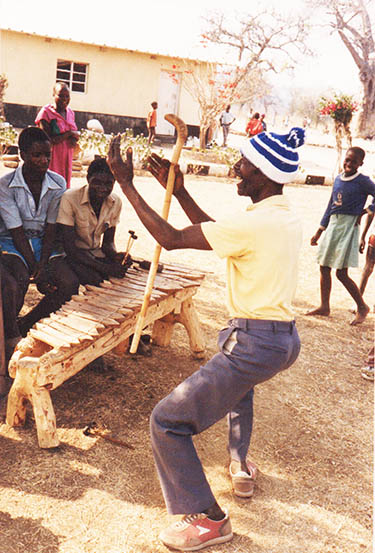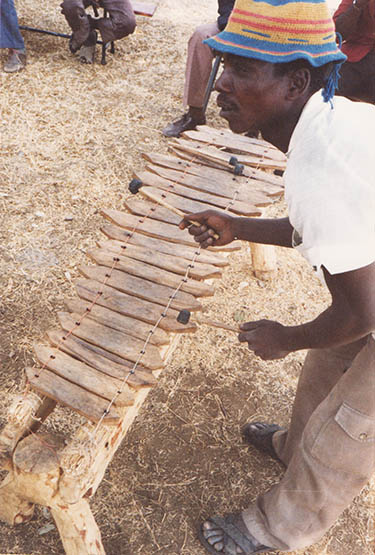Searching for a Zimbabwean Hocket
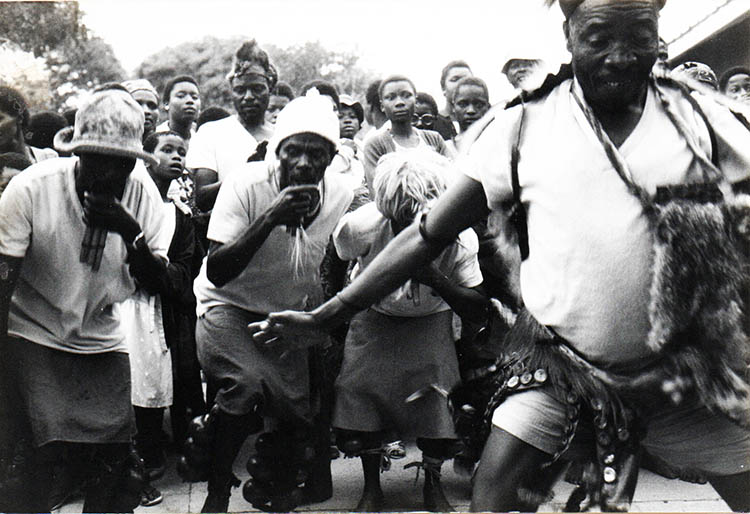
I really couldn’t tell if it was a wind up. The approach was in excellent English, not only in terms of the vocabulary and grammar but also in its complicated politeness. Apologising before it started, allowing for the possibility of complete rejection, and combining the most earnest of enquiries with the broadest of grins. It felt like my questioner had been waiting for this rare encounter with a foreigner to get the final word on the subject.
“May I ask you a question? Now I know this can’t be true, but I have heard it said - and please tell me if I am completely wrong, for we are often told lies and we have no way of testing the truth on many questions - but I am sure you can help me here. Yes, is it really true that England is a land without bananas?”
“It is. We eat bananas from other countries, but we have no bananas of our own.”
“So it is true. Ha ha ha. I find this impossible to imagine. How can people live in a land without bananas?” He laughed again and turned to others in the group to share this extraordinary thought. But it was a subject mainly of interest to him, and the conversation quickly moved on elsewhere.
It was August 1987 and I was travelling around northeastern Zimbabwe by bus. Exciting but also hard work in many ways. The buses were hot and crowded, and usually I was the only white person. Not that that was a problem in itself, but it often required an explanation and sometimes aroused suspicion. Why was I travelling by bus? Where was I going? Why was I on my own?
Lots of short conversations with different people, usually friendly, sometimes a bit hostile, sometimes really good value like the banana conversation. Not being a particularly seasoned traveller, I was still finding my own position in all this, working out how to present myself. I often didn’t feel as relaxed or confident as I would have liked to. I explained that I was a musician and was interested in traditional music. Sometimes I got out the mbira that I had made myself, and played a Shona piece on it. This often led to good conversations about music and musicians. Far from being everywhere, as the popular myth has it about music in Africa, you often had to search it out. Knowledge was very localised and it all depended on who was around and a few individuals who played. Drums and singing yes, mbira in some areas but not others, other instruments quite thinly spread.
On this trip I was carrying my long black box with a white line round it and people always wanted to know what was inside. The bus stopped for refreshment at a rural bottle store near Mutoko, but when I tried to reveal the contents of my box I discovered I had lost the key. This didn’t turn out to be a problem - the shopkeeper soon found one that fitted and gave it to me. After embarrassing him by offering to pay for the key, I played a few notes on my soprano sax to show what it did and started asking about local music. I had actually come in search of a style of pan pipe music called ngororombe which I’d heard existed in this area. I had never heard it, but from descriptions I’d read I thought it might sound something like the music I had been making with short lengths of plastic overflow pipe in my group Overflow a few years earlier. As well as the similarity between the musical instruments - simple tubes made from reeds or plastic - I also have a long term fascination with the hocket, the musical technique where melodies are created by alternating notes from two or more instruments. The people at this bottle store knew of ngororombe and thought there might be a group in Uzumba, half way back towards Harare! They did know an mbira player too, who lived about two hours walk away who maybe I’d like to visit? Should I cut my losses and go for mbira after all? No, I thought not. I was looking for ngororombe. Then the conversation began to get interesting. They remembered a group that had come past the previous week on the back of a lorry. They had this extraordinary instrument with them. One of the men tried to describe it to me.
“Little wooden bowls on a frame,” he said, “You pat them with your hands,” and he mimicked the action with two cupped hands together. “Very, very fast they were playing. It was good, a good sound.”
I was excited. it sounded like a completely new instrument nothing like anything I had heard of, and I wanted to know more. I couldn’t quite envisage the instrument. But, of course, this man hadn’t guessed that he was going to be cross-examined and he had already told me all he could remember.
“But where can I find these people?”
“They were from Nyamapanda, on the Mozambique border. You might find them there. Maybe they are in Harare. They were going to First Street to play music there.”
First Street, the main buskers spot in downtown Harare. Last week I had seen a man with mechanical musical dancing puppets attracting a big crowd. Full of colour. That had reminded me of another busker I had seen on my first day in Harare. He was sitting on the ground playing a home made drum kit made out of wire, tin cans and a bucket. The music was good, but what had struck me about him was how extraordinarily grey he looked. The steel wire, the tin cans with most of the paint stripped off, the sun bleached sticks he was using as beaters. His clothes were grey too, a worn out jacket and ragged trousers. Even his face, hands and bare feet - dusty and hard worn - were more grey than brown. I upset myself by getting some fashion pleasure out of his appearance. I found the blend of greys beautiful and authentic. I had an urge to photograph him but felt embarrassed because I was finding poverty beautiful. So I just smiled and gave him some money before moving on.
That was during my first week when my own responses often surprised me. Gradually, I was working out for myself a way of being in this country, but it was a slow process. My search for ngororombe was taking place six weeks later, but hearing about these First Street buskers made me wonder if I was in the wrong place. Still, I decided to keep to my mission. By now it was late afternoon, and I needed somewhere to stay. I was well outside the tourist areas, but it turned out there was one of the few rural hotels within walking distance. A couple of boys offered to take me there, which they did, and I booked myself in.
I couldn’t work out whether there was anyone else staying in the hotel or not. I was certainly the only person eating an evening meal, which was slices of steak with bread. But the bar was crowded and I drank a couple of beers and had fairly stilted conversations with a few people. I didn’t feel comfortable there, and even though I explained what I was doing I felt there was some suspicion in the air. Then the only white person in the bar casually walked across and started talking to me. He was a farmer, probably in his late fifties and looked weather beaten and rather weary. Then someone near me picked an argument with him:
“Why are you talking to this man? You never talk to us.”
“I do talk to you.”
“No you don’t. You don’t talk to us. You just talk to him because he’s white.”
“No, you’re wrong my friend. I’m just interested to hear what he’s doing here. I talk to anyone. If I didn’t want to talk I wouldn’t have stayed here. I’d have left like the other farmers.”
But he realised the atmosphere was turning rather nasty and he casually walked back to where he was sitting before on the other side of the room. I felt rather depressed by this. It had cut off my relationship with both sides. I didn’t want to take sides, and there was no way I could or should, but I did want to be sociable. It wasn’t late, but there was no electricity in the hotel, and it felt like there wasn’t much else to do, so I went to bed.
I had no idea what time it was when I heard a loud knocking on my door.
“Open up. Police.”
I was frightened. How could I be sure it was the police? And even if it was the police did that mean it was all right?
“How do I know you are police?”
“Don’t worry. Open the door, we want to talk to you.”
Reluctantly, I did, and two policemen in uniform and the hotel manager came in. I was still frightened. The only light in the room was from their two torches and a candle, which the manager was holding. They were flashing the torches around the room.
“May we see your papers?”
“So you don’t have any authorization from the ministry?”
Well, I had talked to officials in Harare about my quest but hadn’t found them very helpful so had decided to strike out on my own. I mentioned a few names and one of them was someone they knew, so we all began to relax a bit.
“You should have a letter. It would be much easier for you.”
Dead right, I thought. Next time I’m going to get one of those letters. Then the conversation came round to their real concern.
“Where is your box?”
“My box?”
“We heard you were carrying a box. Where is it?”
My black box with a white line round it. I thought nothing of it when I checked in at the hotel, not even realising it had been noticed. Then I had put it under the bed for safety. I got it out.
“Please open it”
I got my soprano sax out and played a few notes on it. They were smiling now.
“Some people were worried by what was in your box, but now we have seen, that is alright.”
It could have been a weapon of course. A soprano case is an unusual size and shape. And, after all, didn’t Chicago gangsters carry their machine guns in violin cases? In England I’ve been suspected and even accused of carrying a snooker cue. In rural Zimbabwe at this time there was a lot of fear of South African agents trying to destabilise the new republic, and a white foreigner, travelling on their own, away from the tourist spots would immediately fall into that category. Also we were only fifty miles away from Mozambique, and cross border raids by South African supported Renamo groups were frequent.
Anyway, the three men left my room and I locked the door and lay awake for the rest of the night.
Breakfast was slices of steak and bread again, and I was the only person eating again. I settled up and went to wait for the bus back to Murewa, the nearest you could get to Uzumba on the main road. This time I went straight to the local office of the ministry for youth, sports and culture and tried to get official. Comrade X was very helpful. He knew of a group that played ngororombe and he would take me to find them the next morning. Would I like to go for a walk?
Murewa is famous for its mountain, an enormous mass of solid rock that rises 500 feet straight out of the ground. We walked towards it and Comrade X explained how, in the liberation war, it had been a stronghold for guerilla groups because it was so inaccessible, and that even when Ian Smith’s government helicopters had landed on top of it they’d failed to rout out these groups. Comrade X wore a beret the whole time and walked slightly awkwardly. He explained that he still had a weak skull from an injury sustained as a combatant. He was gradually sounding out my own position and progressed on to fairly gruesome stories about incidents he had been involved in, and his own merciless stance in relation to Smith’s army.
“It was a war”, he smiles. “We had to do everything we could. But all that is over now and we believe in reconciliation.”
I am a bit unnerved by his talk, but I don’t let on. At the same time I am learning a lot. Comrade X is the first ex-combatant I have had a proper conversation with and the day passes quickly.
Comrade X kindly arranges for me to stay with some of his friends, and in the morning we meet to catch the bus. Nothing happens for over an hour, and no one seems to know whether the bus is just late or whether it doesn’t really exist at all. Comrade X goes off and sorts us out a taxi instead. It only has one gear, second, but the roads are very rough anyway, so twenty mph is a comfortable speed. After about an hour and a half we reach our destination, a bottle store and shop with a few houses around it. Word is sent out that we are interested in ngororombe and we sit down to wait.
I’m beginning to feel bored and frustrated. We’re well into the third day now. Is all this worthwhile, or is it going to come to nothing, a waste of time? At the same time I have guilt feelings. Comrade X has given up his whole day for me, and now it seems that men and women are walking from all over the district to play for me, in what is beginning to feel a bit like a royal command performance. What am I offering in return? Not very much, I think to myself.
A local man asks if I play chequers. Why not? It’s going fine, but I make the rude mistake of winning and my opponent stops smiling and declines a second game. Oh dear.
But people are beginning to gather. A man who has been playing mbira in the bottle store goes outside and settles himself under a tree to start playing. His patterns are flowing and gentle, simpler than most of the mbira music I’ve heard. Soon he is joined by two shaker players and the rhythm is growing. And now a surprise. Panpipe players are gradually appearing as if from nowhere, and they are joining in with the mbira. Some have three pipes bound together, some have only two, but they blow hard across the top fitting their notes in with the mbira pattern. The surprise is that the mbira is actually playing ngororombe, and it hadn’t even occurred to me that the pipes and mbira could or would be played together. People are gathering round them now and expectations growing, but after five minutes they stop. Comrade X explains that they are all here now, but they want to put their costumes on and start properly in a few minutes.
Half an hour later they return clad in simple but beautiful costumes, cotton shirts and tunics, some adorned with animal skins and feathers. They launch in to a full scale performance. Movement, instrumental sounds, vocal sounds are fully integrated in to an ecstatic whole which thrills me immediately. All the panpipe players are men as are the drummers and mbira player. But a choir of women has also gathered who sing, dance and play the hosho shakers. They play and dance ecstatically for twenty minutes, repetitive melodically and rhythmically but varied verbally as solo voice sections alternate with choral ones and the stamping dance movements also allow variation and individual expression from men and women. They are used to performing and direct their music to the audience which has now gathered next to Comrade X and me. I’m soaking up the feeling but trying to analyse at the same time.
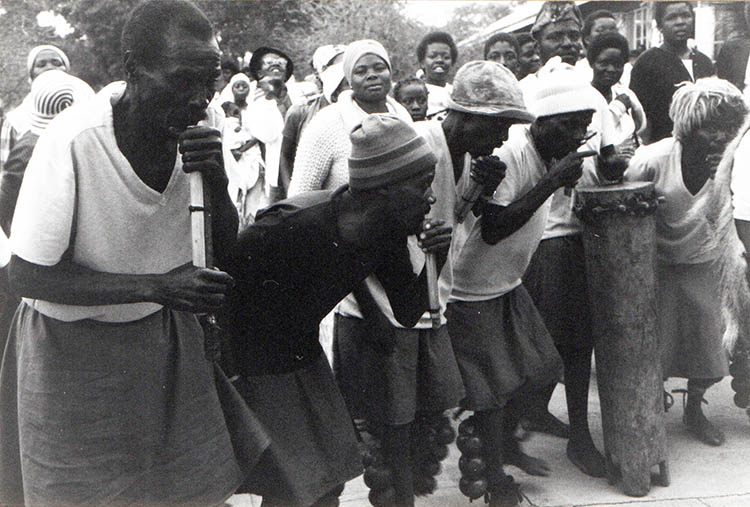
What is special about this music? First of all it’s the number of layers. There’s the hocketing pan pipe pattern, paralleled by the mbira (although you can hardly hear this once every one is playing), the vocal line sung mainly by the women, the vocal gasps and shrieks interjected by the pan pipe players. All very rhythmical, but driven along even more by shakers and drums. An ecstatic, celebratory music.
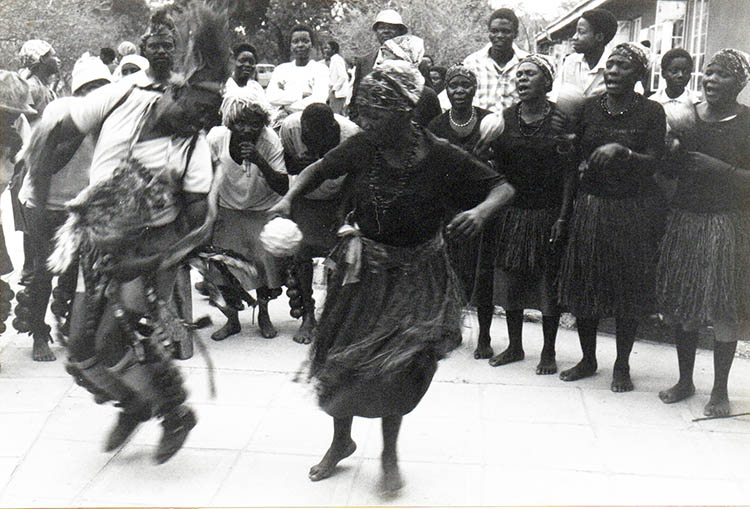
I want to understand this music better so I ask if it is possible to hear the panpipe players on their own. It is then that I realise immediately what it is that is exciting me. Each player is not only hocketing with the group, he is also hocketing with himself! The gaps between the panpipe notes are just enough to fit in a voice sound, some of which are probably inhaled rather than exhaled. So it’s like playing a game with yourself, blowing the pipe, singing and still managing to breathe too. It gives the music extra intensity and conviction, and the variation in vocal sounds keeps it fluid and changing too.

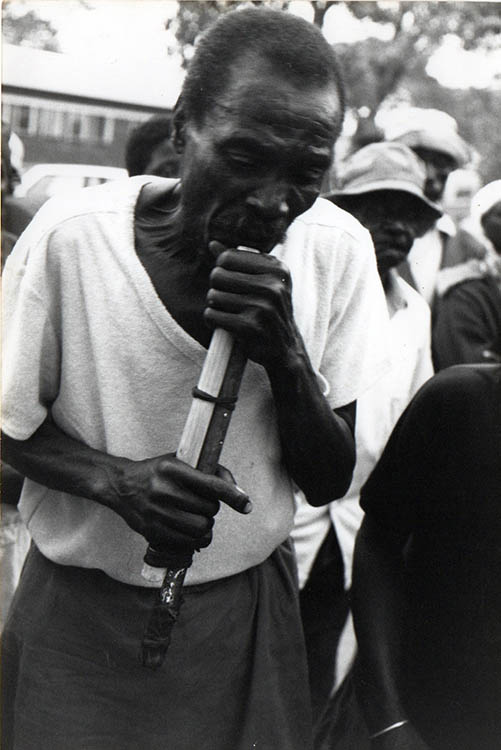
I ask if I can join in with my saxophone. Of course they say, and they start up again. First of all I try to copy some of the patterns I hear the panpipes playing and ease my way in to the overall sound. It’s not so easy. Even though the music is made from repeating patterns, the rhythmic coordination is subtle and I feel a bit superfluous. Then I try a more improvised approach, making longer melodies that I feel float on top of the overall sound. This feels more comfortable and is not far from the jazz forms I know well, where one instrument solos with an accompanying rhythm section. But how does the group hear it? I try to ask this question when we stop, but don’t get very far. They want to hear me playing on my own to discover my instrument, this industrial manufactured object that they may never have seen or heard before. I play several jazz themes that I know well and a little bit of improvisation. I try to play melodically and rhythmically yet I have the impression it isn’t quite connecting.
What is achieved by joining in? Who does it help? To me it felt like a sharing that I really wanted, but then I had very much set the agenda. This was the culmination of a long search, and I wanted to be part of the music in some way, not simply consume it. But to them I was an outsider who had arrived out of the blue who was making demands on them. How could I imagine what they might be thinking or imagining? They asked me about where I came from and whether I could perhaps arrange for them to perform in England, but I answered vaguely, not wanting to make false committments. I felt the link with Comrade X had just made this exchange all right. This sort of encounter wouldn’t have been possible without him. Listening to the instruments individually had seemed ok too, because not only was there a musicological motive - I wanted to try and work out how the music fitted together - but it also made a more personal relationship with members of the group, even though talking was hard because we spoke different languages.
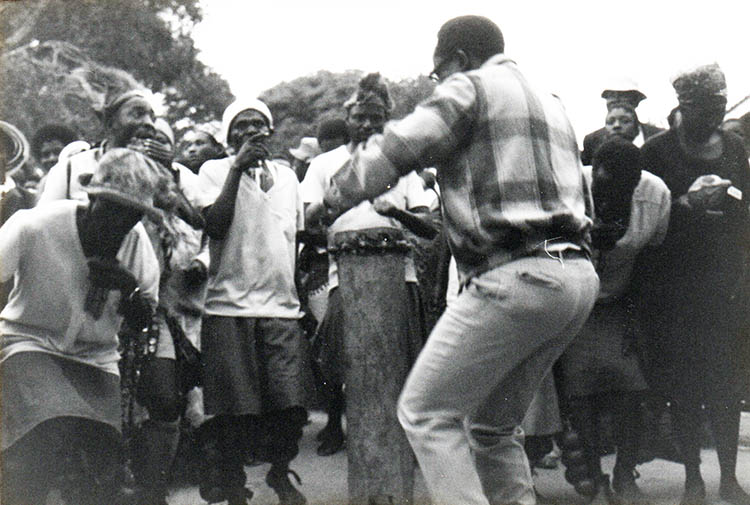
I would like to have been able to talk about my group Overflow, about how it had been partly inspired by other African musics that use the hocket technique for knitting together the simplest resources in to a complex whole. Musics that I had been privileged to hear on records without ever leaving my home country. I would like to have explained that, like them, I used materials that were close at hand and readily available. In their case it was the hollow reeds bound together with other vegetable matter for the panpipes and seed pods for the shakers. In my case it was plastic pipes, bought at the local DIY store, which I then cut in to suitable lengths, and rounded-off the ends by half melting them with a blowtorch. I would have liked to have discussed the different playing techniques. On the one hand, their extraordinary skill in alternating hard blowing across the top of the tube with guttural vocal sounds. On the other hand my basic technique of buzzing the lips in to the tube like a trumpet, which also allowed some expressive details through lip control. How I also sometimes whistled in to the longer pipes and how the acoustics of the pipe created a melody by resonating and selecting only the pitches that corresponded to its own harmonic series. I wished I had brought photographs and sound recordings of my group to at least give some indication of where I was coming from. But I hadn't because the main purpose of this visit to Zimbabwe was research of mbira and I had decided what I would bring in relation to that. If I was staying longer I could of course have had a more equal and developed exchange. But, for now, I could only reflect on the limits of the possible and be grateful for the generosity of this beautiful music.
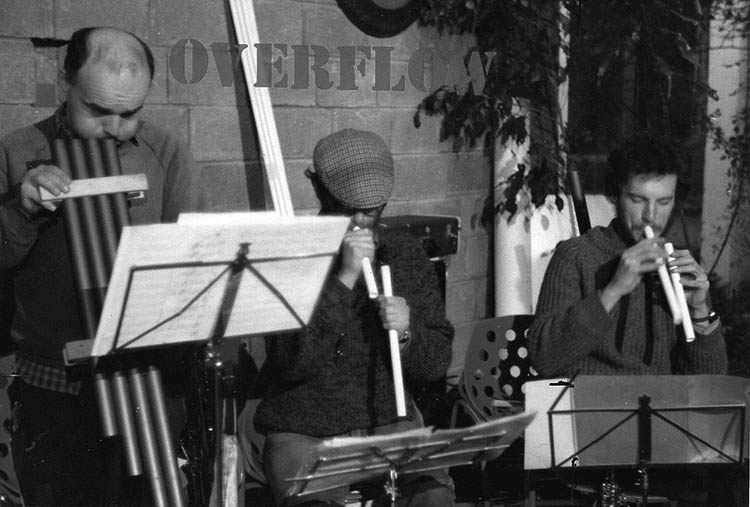
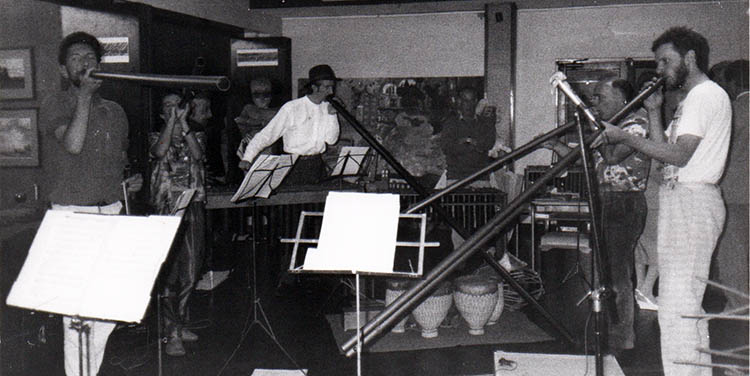
It was not long until we had to drive back to Murewa, and the next morning after making polite farewells and exchanging addresses, I got on the bus for Nyamapanda. I had remembered the fascinating instrument that had been described to me three days ago, and decided to try and find it.
This time I started at the school which served as the centre of this community since it wasn’t big enough to have any government administrative offices. There seemed to be a lot of people around, and I quickly introduced myself to the head teacher, explained my mission and mentioned a few of the names of people I’d met in the last few days.
“I think you are very lucky”, he said. “Today there are many people here because food aid is being given out because of the drought. Even this morning some people were dancing and playing music, so if we ask I think we can find something for you.”
Well, yes, I was lucky, but was I pushing my luck too far? These people were so hungry, they had no mealie meal of their own, and here I was from the rich west on what was beginning to feel like an indulgent research trip looking at musical instruments. How could I handle this? The only way was to go with it. After all it wasn’t up to me to decide whether their hunger meant that music was less important.
The head teacher took me outside to a group gathered under a tree. There was a marimba and a long drum lying on the ground. I was introduced to the group, and they said they would play for me. This music was extraordinary. Unlike anything I had heard before in Zimbabwe. The marimba itself was beautiful. A very chunky wooden frame, with a tree trunk look to it, and carefully crafted wooden keys, shaped to a point at each end, with gourd resonators underneath. Two young men played it in a dense stream of very fast notes for about ten minutes. Unlike the complex but regular patterns of mbira music, I could find no underlying pattern to this, either rhythmical or tonal. But it was exciting and moving. Another man sat on the drum and played it as it lay on the ground, and a fourth played a shaker made out of a small gas canister. The music was popular and several people were dancing with it.
When they stopped I asked them about the marimba.
“We made it this year, copied from Mozambique ones. Then last week we took it to Harare and played in First Street. People liked us very much!”
First Street! So this must be the instrument that had passed through Mutoko on a lorry. Not a new invention or discovery, but I was thrilled to have found it and heard such exhilarating music.
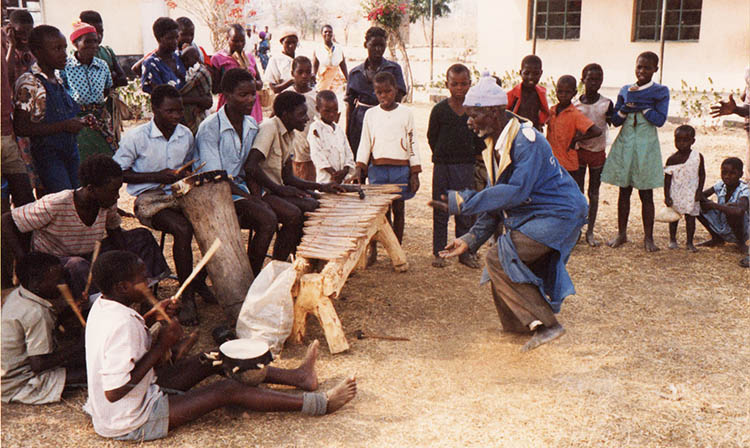
Later on another musician produced an mbira and started playing on it. Again, the music was new to me and I asked the player about it. This mbira was an njari, a type I had read about but not seen before. I was excited, and after he had played another piece I asked, through the head teacher, if I could record each key separately so that I could work out the tuning. The player agreed and played some of the keys fairly randomly (or so it seemed to me) into my microphone.
“I wonder if you could start at that end and then play each key, one at a time to the other end?”
The head teacher translated, and there was some discussion in Shona. The player played five keys in order, and then suddenly jumped to the other row of keys, and then back to the first row.
“Ah. Now I wonder if you could do that again, but play them all in order this time?”
More translation and worried discussion. He started on the other row, nearly got to the end, and then jumped to the first row. I let him continue.
“Ah yes, that’s exactly what I wanted! Thank you!”
Gentle clapping and murmurs of approval from the group. Confrontation avoided. Everyone was happy. I wasn’t sure whether the misunderstanding was deliberate or whether the concept of demonstrating the tuning of the keys was simply too western and removed from actually playing the instrument. But I was sure that I had pushed too far this time. I had asked this man for something he either couldn’t give or didn’t want to give. It was much too early in our relationship to ask for this. It needed feeling around and building up some trust - mutually, not manipulatively. Instead, I felt like a white boss demanding what he wanted but had no right to.
